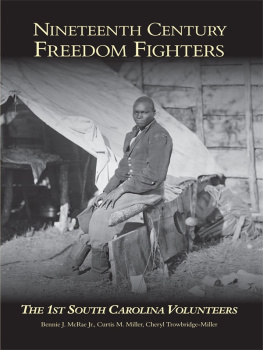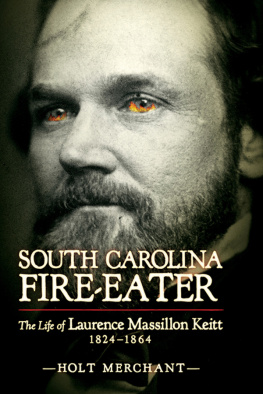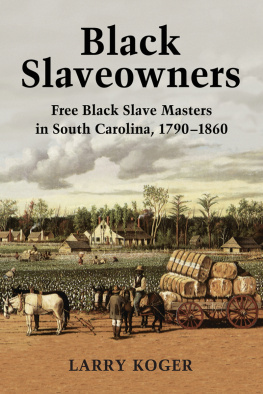STEPHEN A. SWAILS
Southern Biography Series
STEPHEN A. SWAILS
BLACK
FREEDOM
FIGHTER
IN THE CIVIL WAR
AND RECONSTRUCTION
GORDON C. RHEA

LOUISIANA STATE UNIVERSITY PRESS
BATON ROUGE
Published with the assistance of the Michael H. and Ayan Rubin Fund
Published by Louisiana State University Press
www.lsupress.org
Copyright 2021 by Louisiana State University Press
All rights reserved. Except in the case of brief quotations used in articles or reviews, no part of this publication may be reproduced or transmitted in any format or by any means without written permission of Louisiana State University Press.
Manufactured in the United States of America
First printing
Designer: Mandy McDonald Scallan
Typeface: Sentinel
Printer and binder: Sheridan Books, Inc.
Frontispiece/jacket photograph of Stephen Atkins Swails is from the Massachusetts MOLLUS Collection, U.S. Army Heritage and Education Center, Carlisle, Pa.
Library of Congress Cataloging-in-Publication Data
Names: Rhea, Gordon C., author.
Title: Stephen A. Swails : Black freedom fighter in the Civil War and
Reconstruction / Gordon C. Rhea.
Other titles: Black freedom fighter in the Civil War and Reconstruction
Description: Baton Rouge : Louisiana State University Press, [2021] | Series: Southern
biography series | Includes bibliographical references and index.
Identifiers: LCCN 2021010896 (print) | LCCN 2021010897 (ebook) | ISBN
978-0-8071-7626-9 (cloth) | ISBN 978-0-8071-7656-6 (pdf) | ISBN 978-0-8071-7657-3 (epub)
Subjects: LCSH: Swails, Stephen A., 18321900. | Reconstruction (U.S. history, 18651877) | Southern StatesRace relations. | South CarolinaPolitics and government18651950. | United States. Bureau of Refugees, Freedmen, and Abandoned LandsOfficials and
employeesBiography. | African American legislatorsSouth CarolinaBiography. | United States. Army. Massachusetts Infantry Regiment, 54th (18631865) | United StatesHistoryCivil War, 18611865Participation, African American. | African AmericansSouth
CarolinaBiography. | South CarolinaBiography.
Classification: LCC F274.S93 R44 2021 (print) | LCC F274.S93 (ebook) |
DDC 975.7/041092 [B]dc23
LC record available at https://lccn.loc.gov/2021010896
LC ebook record available at https://lccn.loc.gov/2021010897
CONTENTS
CHAPTER ONE
An Angel of God Come Down to Lead the Host of Freedom
CHAPTER TWO
One Plane of Ashes and Blackened Chimneys
CHAPTER THREE
Looking Out from among the Ghastly Corpses
CHAPTER FOUR
Why Cant We Have a Soldiers Pay?
CHAPTER FIVE
I Now Recommend His Being Allowed to Serve
as a Commissioned Officer
CHAPTER SIX
Crowned with Laurels
CHAPTER SEVEN
This Is a White Mans Government
CHAPTER EIGHT
The Political Boss of Williamsburg County
CHAPTER NINE
A Campaign of Intimidation and Terror
CHAPTER TEN
What a Mockery of Justice Is This?
CHAPTER ELEVEN
A Proper Denouement to an Extraordinary Man
ILLUSTRATIONS
Figures
Stephen Atkins Swails
Following page 69
Maps
PREFACE
One fall day in 1978, brothers Jimmy and Edward Moore were driving through Kingstree, a small town in rural South Carolina. As they turned off Main Street onto North Brooks Street, between the Carolina Warehouse and Redmond Funeral Home, they spotted an antique trunk and a basket made from elm bark, apparently set beside the road for removal by one of the towns trash trucks. Later, their curiosity aroused, the brothers turned around and drove back for a closer look. The items were gone; a trash truck had already arrived and was carting them to the towns dump.
Later that day, Jimmy passed the trash dump on his way to a boat landing on the Black River. There he spied the trunk, standing upright and waiting for the countys bulldozer to crush it and cover it with dirt. He got out, walked over to the trunk, and opened it. Inside were reams of papers and documents dating from the Civil War and Reconstruction years. Curious to learn more, he heaved the trunk onto his truck and took it home. That evening he and his brother looked through the contents. Inside were Stephen Swailss army records, booklets and ledgers from the Freedmens Bureau with the names of long-forgotten former slaves, telegraph messages, and letters, including an exchange between Swails and Governor Wade Hampton concerning an attempt on Swailss life.
Although the brothers had never heard of Stephen Swails, they recognized the documents historic worth and presumed that the correspondence bearing Governor Hamptons signature might have some value. They hauled the materials to Samuel McIntosh of the county historical society, who gave them $75 as a finders fee and then donated the contents to the South Caroliniana Library at the University of South Carolina.
Stephen Swailss home once stood where the Carolina Warehouse was later built, which helps explain why his papers ended up there. The last-second rescue of his personal papers was but the most recent astonishing event surrounding this remarkable mans life. Swails, it developed, was a long-forgotten central participant in Kingstrees political history, in the story of African Americans participation in the Civil War, and in South Carolinas Reconstruction experience.
Born in 1832 in Pennsylvania to parents that the census recorded as mulatto, Swails grew up a free Black in a state that had abolished slavery, but whose African American citizens still labored under oppressive social and legal handicaps. In 1863, he volunteered for the most prominent African American regiment raised in the Norththe 54th Massachusettsdistinguished himself in battle, and became the first Black man commissioned as a line combat officer in the US military. After the war, he remained in South Carolina, where he was elected speaker pro tempore of the state senate during Reconstruction. He was instrumental in drafting the states postwar constitution guaranteeing equal rights to African Americans and played an important role in securing the passage of legislation benefiting the states newly liberated Black citizenry. He raised a family in the small South Carolina town of Kingstree, where he was elected mayor multiple times, practiced law, and became Williamsburg Countys political boss. Swails remained active in state politics after the end of Reconstruction and the restoration of white rule in 1877 but was ultimately forced to leave South Carolina by the white power structure, which threatened to kill him if he remained. Despite numerous threats against his life, he returned to South Carolina regularly and labored to advance the cause of Black candidates. Swails died in 1900 and remained largely forgotten for the next century.













